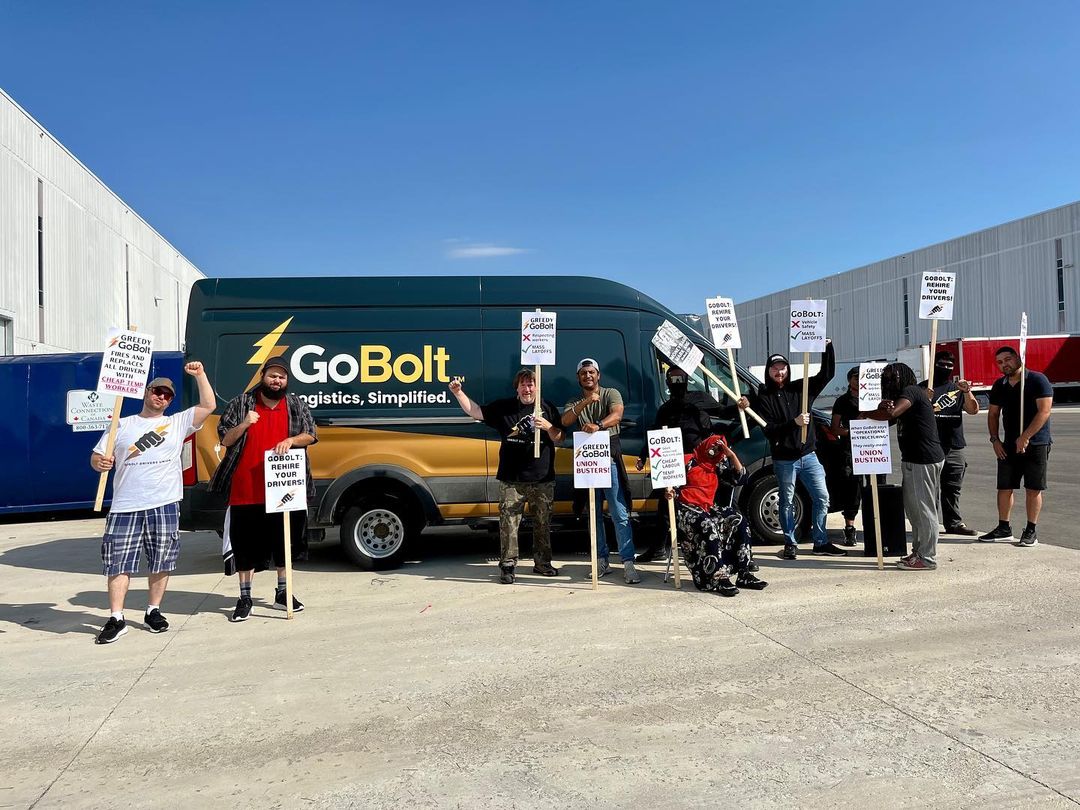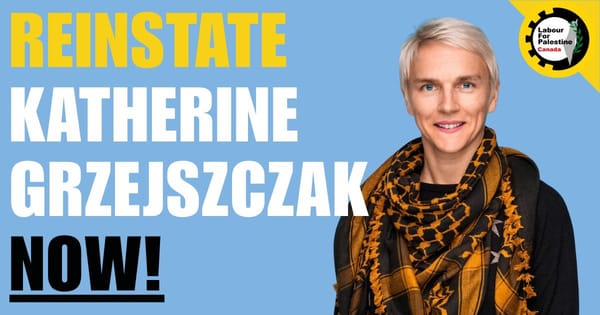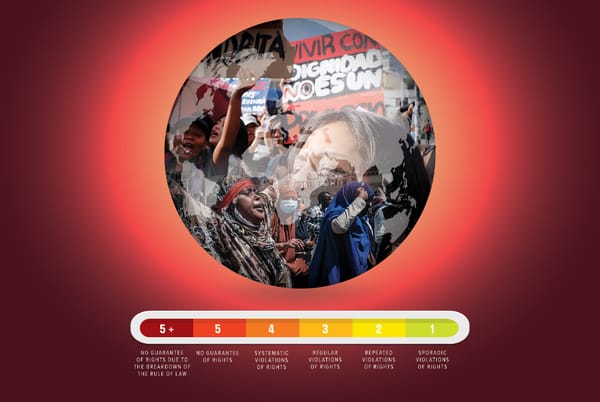
Delivery drivers at the logistics firm GoBolt are fighting for their jobs back after the company summarily and unexpectedly fired them late last week. These 24 workers recently organized a union with the Teamsters and were in the midst of bargaining their first collective agreement when news of the mass lay-off came.
The drivers are based out of the company’s Markham, Ont., warehouse and deliver packages in the Greater Toronto Area. GoBolt (or Bolt Technologies Incorporated, as the company is formally called) is headquartered in downtown Toronto but has operations across North America and claims to employ more than 1,000 people.
Delivery drivers in Markham are the only unionized employees in GoBolt’s North American operations, but, according to one union member who spoke with Class Struggle, workers were in contact with GoBolt drivers in other cities to aid their organizing efforts.
Workers believe the company is retaliating against them for unionizing, and have begun a campaign of picketing and seeking broader community support to pressure the company to rehire them and negotiate a contract. In particular, the laid off workers are asking supportive members of the public to contact Bolt Technologies CEO Mark Ang and tell him to “rehire your workers.” (A form letter and contact information can be found here.)
GoBolt’s anti-labour actions, while shocking and egregious, are unfortunately entirely ordinary. Companies, particularly those who brand themselves as part of the ‘tech sector,’ frequently respond to union organizing by retaliating against workers and using every possible legal channel to evade bargaining and exhaust unions. In some cases, company intransigence reaches the level of firings, as has happened in this case. Although terminating workers for union organizing is unlawful, employers and adept management-side lawyers find ways to get away with it.
Tech firms have also been known to ‘jurisdiction hop’ to avoid unfavourable laws or court rulings. Recall that when couriers at Foodora in Ontario unionized with the Canadian Union of Postal Workers (CUPW) in early 2020, the company first attempted to argue that its workers were not employees but contractors, and when this failed, closed its operations and moved out of Canada entirely.
Despite a favourable ruling from the Ontario Labour Relations Board (OLRB) that affirmed the right of Foodora couriers to unionize, the law was unable to compel Foodora to stay and bargain. After CUPW filed an unfair labour practice complaint against the company, the workers were ultimately awarded a settlement of $3.4 million, which eased the financial hardships of job loss but was no substitute for maintaining a collective bargaining relationship with the company. Foodora’s abrupt departure likely also had a chilling effect on organizing among app-based workers. Footloose capital demonstrated it was willing to punish workers and jurisdictions where labour rights are upheld.
In GoBolt’s case, workers were already in an employment relationship with the company prior to their organizing drive. The workers initially filed for union certification in May. After some haggling over the scope of the bargaining unit, an election was held on May 25. Ninety-three per cent of the workers voted for the union and on June 9, the OLRB certified the bargaining unit as members of Local 938 of the Teamsters.
Retaliation was swift and incremental. Workers report that immediately following their unionization they saw a steady increase in the number of agency workers being utilized by the company. There appeared to be a deliberate attempt to redistribute the work of employees in the bargaining unit to outside contractors supplied through labour for-hire agencies.
According to a GoBolt worker, the company informed the drivers that they are moving to a “delivery services partner” (DPS) model, similar to Amazon, whereby third-party firms are contracted to fulfill deliveries. Under such models, lead firms are no longer responsible for the employment conditions of workers. A DPS company could directly employ drivers or engage them as bogus ‘independent contractors.’ In either case, GoBolt would effectively use this contracting relationship to avoid bargaining with union members in Markham, and if rolled out across their North American operations, they company would prevent workers from unionizing at other warehouses.
As the affected union members understand it, supposed “operational restructuring” is really veiled union busting.
This is a company that has branded itself as a socially and environmentally responsible last-mile logistics firm. As I’ve argued in a previous newsletter, however, union busting is an all-too-common practice among supposedly ‘socially conscious’ businesses. Although many firms wrap themselves in progressive branding when it comes to environmental and social issues, the vast majority resist the efforts of their workers to form unions and collectively bargain.
GoBolt seems to be carrying on this two-sided tradition. While it boasts of more than 10 million package deliveries in its short existence, it has promised to transition to “carbon neutral deliveries” by December. This pledge largely involves moving to a fleet of electric vans, while also “sequestering our carbon footprint” and “optimizing our operations for a circular supply chain,” whatever exactly that means.
Originally founded as Second Closest in 2017, a “rebrand” in July 2021 transformed Bolt Technologies into its current incarnation and increased its focus on supposedly environmentally sustainable warehousing and last-mile delivery. In Canada, GoBolt operates warehouse fulfilment centres in Toronto, Ottawa, Montreal and Vancouver, and has business relationships with “box mattress companies, furniture businesses and e-commerce entrepreneurs.”
The company’s website further cites over 160 million USD in capital investment, including funding from BMO capital markets, Intact and a host of other venture capital sources.
By mid-2021, Bolt claimed revenue growth of 400 per cent from Q1 2020, more than 400,000 square feet of warehouse space and 100 delivery vehicles across its Canadian network. With expansion into the United States beginning last year, it’s unclear how large its total operations are at present.
As is common practice among firms in the broadly-defined tech sector, GoBolt also claims to be utilizing technology to optimize last-mile delivery and reduce emissions in the process. It’s difficult to ascertain exactly what the innovation is here that would distinguish GoBolt from other logistics firms that use digital inventory systems to optimize fulfilment and delivery. The invocation of “technology,” as with other similar firms, appears as much a branding exercise as anything else.
However, what is particularly notable is the way GoBolt’s claims about carbon neutrality and sustainability may be undermined by its move to a contractor-based model of delivery. While the firm has ostensibly transitioned much of its in-house fleet to electric vehicles, according to workers, the vast majority of GoBolt parcels are now being delivered by outsourced labour in conventional, gas-powered vans.
It’s unclear if GoBolt has made its “operational restructuring” and the impacts this could potentially have on the company’s carbon neutrality pledge clear to investors. As it stands, it appears that environmental sustainability and union busting don’t mix well.
At the time of writing, the workers’ fight remains ongoing. There are promising signs of solidarity on the picket lines and online. But make no mistake, union busting is a disgusting practice and it takes concerted organization and public support to beat it back.
As union members see it, “The message is clear and the solution is simple”: full reinstatement for all fired workers and bargaining in good faith with the union are the answers.
EDITOR’S NOTE: This article has been updated to clarify the nature of the new model proposed for drivers.
Recent Class Struggle Issues
- October 2 | California Fast Food Workers Have Won A $20 Minimum Wage
- September 25 | Labour Arbitration Is No Alternative To A Strike
- September 18 | Reviewing The State Of The Labour Market – August 2023
- September 11 | A Look At The State Of Labour In The Atlantic Provinces







